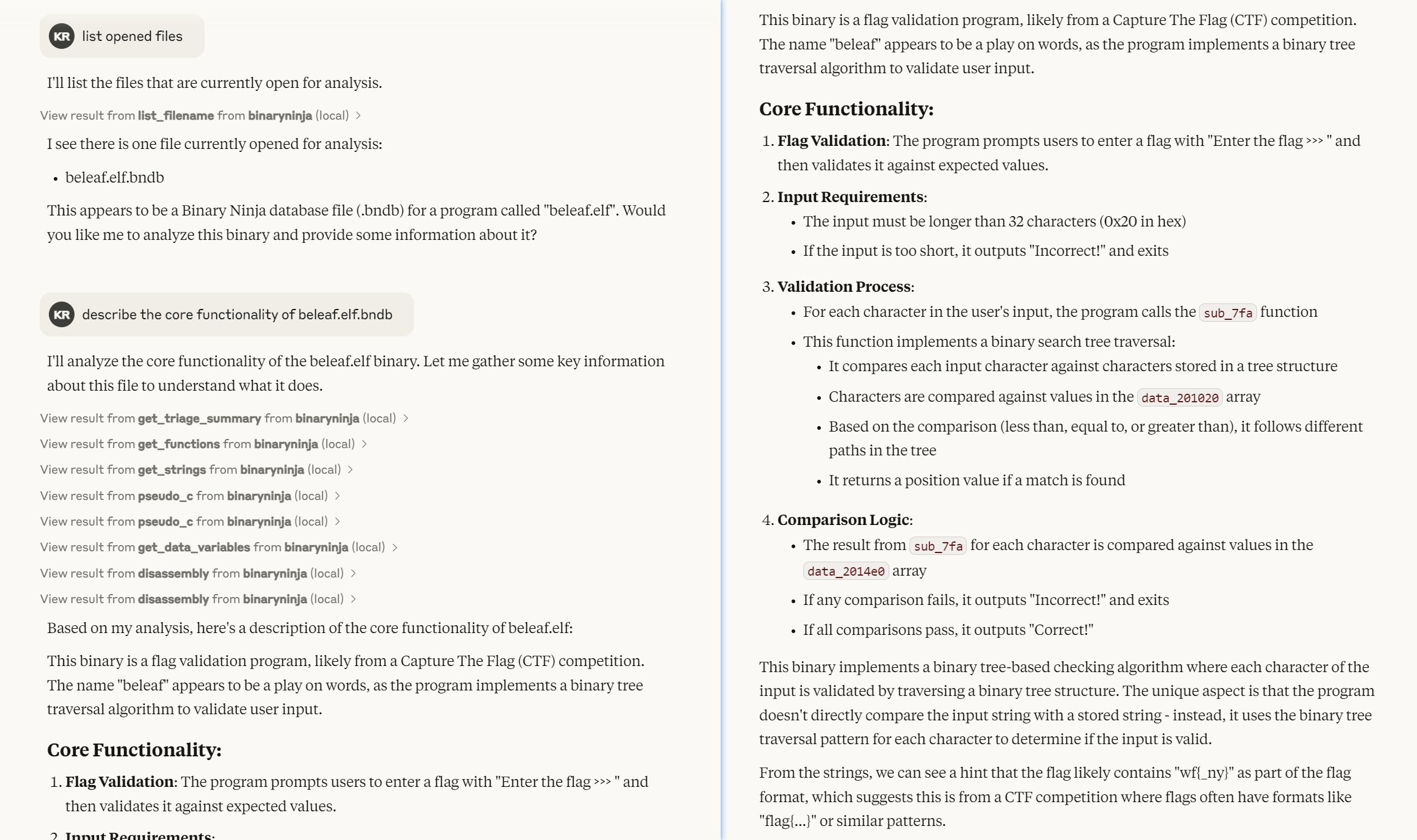Binary Ninja
STDIOMCP server enabling Binary Ninja integration for AI models via Claude and Cherry Studio
MCP server enabling Binary Ninja integration for AI models via Claude and Cherry Studio
English | 中文
The tests/binary/beleaf.elf is taken from CSAW'19: Beleaf - Nightmare. You can also find the complete writeup from the link above!

See: Key Differences from the Existing Plugin
There are two ways to run the MCP server:
Binary Ninja UI Plugin:
Settings - MCP Server - Auto StartSettings - MCP Server - Server port numberBinary Ninja Headless Mode:
uvx binaryninja-mcp install-api # only run once uvx binaryninja-mcp server <filename> [filename]...
filename could be any binary files or BNDB, like in UI mode, all opened
files are available to the MCP client.--port flag to specify a different portClaude Desktop (stdio relay client): Configure the client to connect via stdio transport using built-in relay.
{ "mcpServers": { "binaryninja": { "command": "uvx", "args": ["binaryninja-mcp", "client"] } } }
Cherry Studio:
http://localhost:7000/sseuvxbinaryninja-mcp
client
Add --port 12345 to both server and client command line if you prefer to run
MCP server on port other than default.
The MCP server provides the following tools:
rename_symbol: Rename a function or a data variablepseudo_c: Get pseudo C code of a specified functionpseudo_rust: Get pseudo Rust code of a specified functionhigh_level_il: Get high level IL of a specified functionmedium_level_il: Get medium level IL of a specified functiondisassembly: Get disassembly of a function or specified rangeupdate_analysis_and_wait: Update analysis for the binary and wait for
completionget_triage_summary: Get basic information from BinaryNinja Triage viewget_imports: Get dictionary of imported symbolsget_exports: Get dictionary of exported symbolsget_segments: Get list of memory segmentsget_sections: Get list of binary sectionsget_strings: Get list of strings found in the binaryget_functions: Get list of functionsget_data_variables: Get list of data variablesMCP Resources can be accessed via URIs in the format:
binaryninja://{filename}/{resource_type}
The server provides these resource types for each binary:
triage_summary: Basic information from BinaryNinja Triage viewimports: Dictionary of imported symbols/functionsexports: Dictionary of exported symbols/functionssegments: List of memory segmentssections: List of binary sectionsstrings: List of strings found in the binaryfunctions: List of functionsdata_variables: List of data variablesuv is the recommanded package management tool for this project.
git clone https://github.com/MCPPhalanx/binaryninja-mcp.git "${env:APPDATA}\Binary Ninja\plugins\MCPPhalanx_binaryninja_mcp"
Binary Ninja API must be installed into virtualenv manually.
uv venv uv sync --dev # install binaryninja API binaryninja-mcp install-api # check API is correctly installed uv run python -c 'import binaryninja as bn; assert bn._init_plugins() is None; assert bn.core_ui_enabled() is not None; print("BN API check PASSED!!")'
For MCP clients with stdio transport like Claude Desktop, change working directory to development folder.
{ "mcpServers": { "binaryninja": { "command": "uv", "args": [ "--directory", "C:/path/to/binaryninja-mcp", "run", "binaryninja-mcp", "client" ] } } }
SSE-enabled MCP clients can connect using: http://localhost:7000/sse
uv build
pytest # To update test snapshots: pytest --snapshot-update
The PyPI package version is automatically derived from Binary Ninja's
plugin.json (using package.json format), maintaining version consistency
between the BN plugin and PyPI package.
# bump alpha version uvx hatch version a # bump release version uvx hatch version minor,rc uvx hatch version release
See: Versioning - Hatch
uv publish